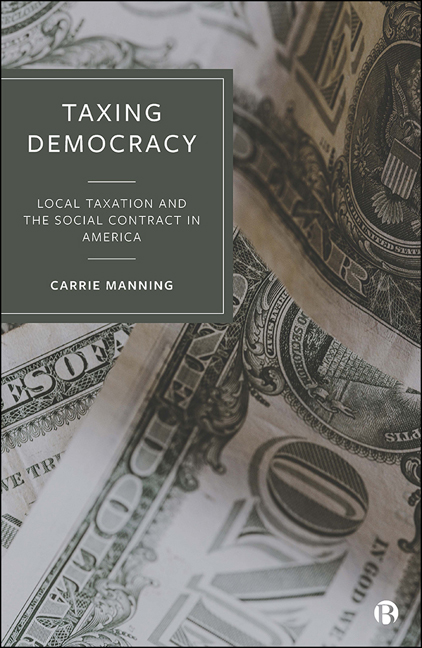Book contents
- Frontmatter
- Contents
- Acknowledgments
- 1 Taxes and the Social Contract
- 2 States, Taxes, and the Polities They Create
- 3 The US Tax State and the Limited Social Contract
- 4 Tax and Expenditure Limitations vs. an Expanding Social Contract
- 5 Implications of the Reliance on Fines and Fees
- 6 Taxing Democracy: Conclusions
- Notes
- References
- Index
3 - The US Tax State and the Limited Social Contract
Published online by Cambridge University Press: 20 January 2024
- Frontmatter
- Contents
- Acknowledgments
- 1 Taxes and the Social Contract
- 2 States, Taxes, and the Polities They Create
- 3 The US Tax State and the Limited Social Contract
- 4 Tax and Expenditure Limitations vs. an Expanding Social Contract
- 5 Implications of the Reliance on Fines and Fees
- 6 Taxing Democracy: Conclusions
- Notes
- References
- Index
Summary
Introduction
This chapter examines the construction of the US tax state. As argued in Chapter 2, state formation and consolidation rest on a tax bargain. In this model, there is a moment of state founding, when a tax bargain emerges that allows the state to extract revenue with some regularity and predictability. This tax bargain is based on and limited by a social contract – a set of shared understandings about the reciprocal obligations that governments have with their citizens. It encompasses an understanding about the purpose of government, its limits, and the boundaries of the political community.
If a social contract is a conceptual device that captures consensus on what states and societies owe one another, then the tax bargain is the clearest outward manifestation of that contract. The tax bargain determines who pays taxes, who derives the benefits that taxes pay for, and what is the acceptable scope and scale of the state. Because taxes pay for public goods like schools, essential services for the poor, and public safety, the tax bargain also prescribes the level of equity in societies. Major tax reform threatens to change the balance. It amounts to a potential change in the social contract. This is why taxation is contentious and politically fraught. Tax policy can be an instrument of change or a force for entrenching the status quo.
As discussed in the preceding chapter, tax historians, fiscal sociologists, and comparative political scientists have written extensively about the theoretical and historical development of the tax state. Several common threads run through this scholarship. First, the modern state is a tax state – a state that can rely on a steady stream of revenue extracted from people and resources within the territory it controls. Taxes are the essential foundation of the modern state, which can provide security, stability, and the underpinnings of a market economy (including the protection of private property). Second, through taxation, subjects become citizens. Third, economic factors play an influential role in forming the tax state. But so do political institutions. Where the political system provides for broad citizen participation in decision-making regardless of economic status (as in an electoral democracy), political action can offer a counterweight to economic power.
- Type
- Chapter
- Information
- Taxing DemocracyLocal Taxation and the Social Contract in America, pp. 39 - 64Publisher: Bristol University PressPrint publication year: 2023



